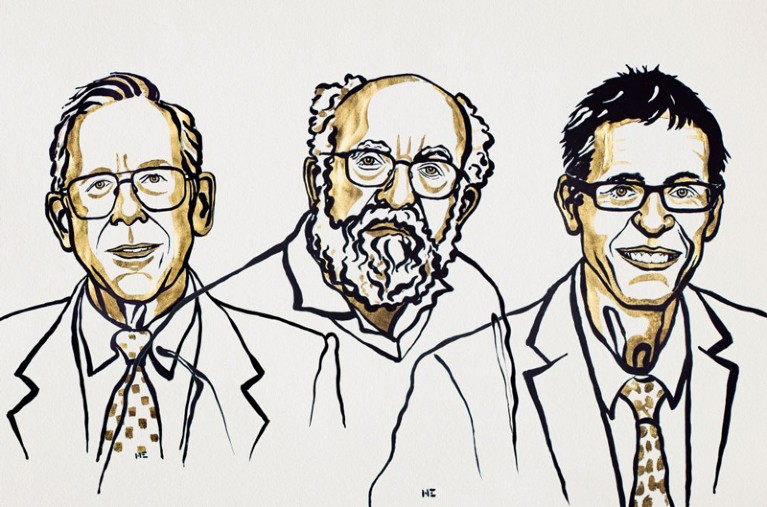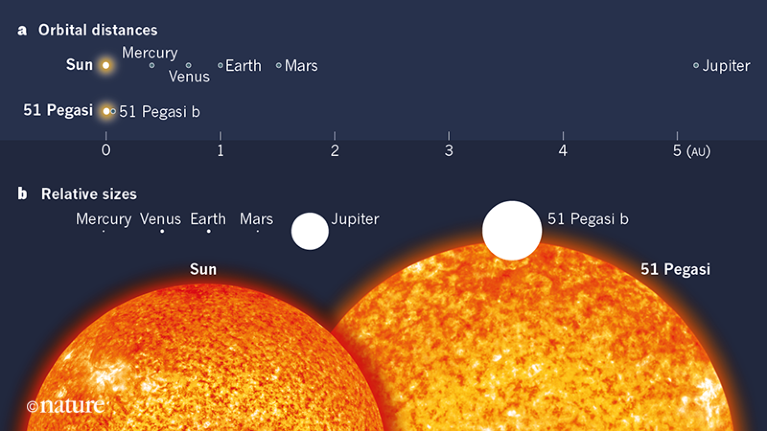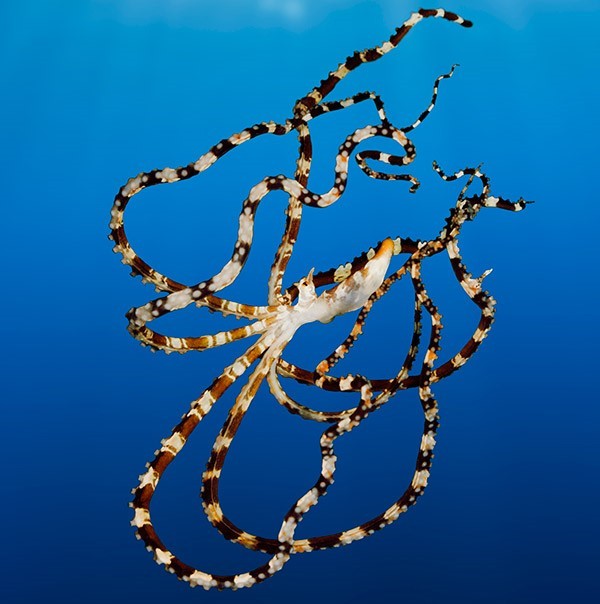Hello Nature readers, would you like to get this Briefing in your inbox free every day? Sign up here.

Cosmologist James Peebles (left) and exoplanet astronomers Michel Mayor and Didier Queloz (right) share the 2019 Nobel Prize in Physics.Credit: Niklas Elmehed/Nobel Media
Physics Nobel looks to the skies
Astronomers Michel Mayor and Didier Queloz will share half of the 2019 Nobel Prize in Physics for their 1995 discovery of the first exoplanet orbiting a Sun-like star. They detected the planet through its tiny gravitational pull on the star 51 Pegasi, a technique that is now used to study some of the more than 4,000 exoplanets known to exist.
Cosmologist James Peebles will receive the other half of this year’s physics Nobel for his widely influentialtheoretical work describing how the cosmos evolved following the Big Bang. His insights include how the cosmic microwave background came to diffuse the Universe, and how dark matter helped to conjure the galaxies and clusters we know and love from a nearly uniform initial state.

Figure 1 | The planetary systems of the Sun and of 51 Pegasi. a, In the Solar System, gas-giant planets, such as Jupiter, orbit far from the Sun. In 1995, Mayor and Queloz1 reported the discovery of 51 Pegasi b — a gas-giant planet that is much closer to its host star, 51 Pegasi, than Mercury is to the Sun. The orbital distances of the planets are given in astronomical units (1 AU is the average separation between Earth and the Sun). b, The sizes of all objects are shown approximately to scale.
Read more about Michel Mayor and Didier Queloz’s 1995 discovery in an expert Nature News & Views analysis from astronomer Eliza Kempton.
Reference: Mayor and Queloz’s 1995 Nature paper
US plan to DNA-print immigrants worries bioethicists
A US government plan to routinely collect DNA data from people held in immigration detention centres is sparking concerns among bioethicists about privacy and discrimination. More than 40,000 people are currently being held in such centres across the country, and the plan would potentially see all their DNA profiles added to an FBI database alongside those gathered from people who have been arrested or convicted of crimes. Because family members share DNA, the government’s plan also has implications for immigrants’ relatives, including US citizens.
Sudden stratospheric warming spotted down south
An advanced climate model is predicting how a rare atmospheric phenomenon currently heating the air above Antarctica will drive hot, dry winds across eastern Australia over the next three months. It’s the first time meteorologists have been able to predict this kind of sudden warming event in the Southern Hemisphere. The forecast has excited scientists because it shows how far the field has come in understanding the stratosphere — the second major layer of Earth’s atmosphere — and its effects on weather.
Alarming scale of wildlife trafficking
Almost one in five land vertebrates are traded on wildlife markets — a proportion 40–60% higher than previous estimates. The findings come from one of the most comprehensive studies of the international wildlife trade so far. The team found that 5,579 of the 31,745 species of mammal, bird, amphibian and reptile analysed — around 18% — are being bought and sold. Many traded species are threatened or vulnerable to extinction.
FEATURES & OPINION

A US magazine advertisement from around 1950.Credit: Granger Historical Picture Archive/Alamy
Tobacco: the weed that’s hard to kill
A new book by historian Sarah Milov manages to bring fresh insight into the well-trodden tale of the tobacco industry’s shameful campaign to delay regulation while millions died because of its products, writes reviewer Felicity Lawrence. Milov adds a nuanced account of how the United States government turned tobacco merchant to boost the industry.
How science has shifted our sense of identity
Biological advances have repeatedly changed who we think we are, writes historian Nathaniel Comfort. He argues that many of the worst chapters of history result from ‘scientism’: the belief that science is the only valid way to understand the world and solve social problems. “Where science has often expanded and liberated our sense of self, scientism has constrained it,” writes Comfort.
This is the third of a series of essays on the roots of today’s research system. Read why, on Nature’s 150th anniversary, we’re looking back to learn how to navigate the present.
Can a computer write for The New Yorker?
Google’s machine-learning algorithm, trained on squillions of emails, will complete your sentences for you in Gmail. What happens when The New Yorker trains it on its archive of standard-setting long-form journalism? Or on the opinions of psychologist Steven Pinker? Take a deep dive into the myriad ways that computer scientists have tackled the thorny problem of human language while you find out.
IMAGE OF THE WEEK

Happy World Octopus Day! This beauty is the wonderpus octopus (Wunderpus photogenicus). Octo-fans should also check out Heidi the day octopus (Octopus cyanea) changing colour as it sleeps. Then go 1,600 metres deep with a probably-as-yet-unknown-to-science cirroteuthid octopus that billows so soothingly it looks like it’s in slow motion. (Don’t miss the audio of delighted researchers saying “wow” a lot.)Reinhard Dirscherl/Getty
